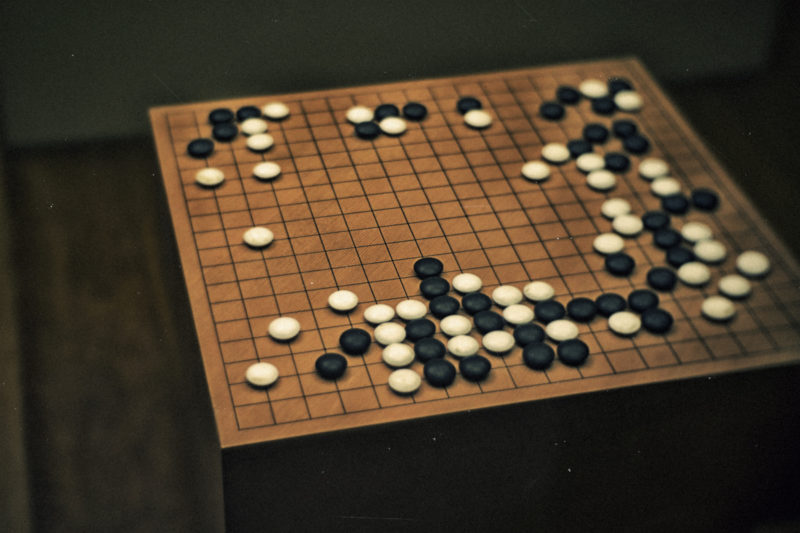Since December 29, 2016, a mysterious player named “Master” has been sweeping across online platforms of the Ancient Chinese game Go and defeating its top players. Master’s record now is 60 wins and zero losses, including a victory over Ke Jie of China, the world champion of Go. As Master’s winning streak continues, many have concluded that this player could not possibly be human, but is instead run by artificial intelligence.
Go is a board game invented in Ancient China in which two players take turns placing black and white stones on a grid. The goal of the game is to surround your opponent and take up the most territory on the board. Go is now frequently played online in a fast-paced method, in which players make at least three moves every 20 seconds. While the rules of Go seem relatively simple, the game is in fact incredibly complex. Not only does it require great mental stamina, intuition, and strategy, but each player’s turn also possesses a countless number of possibilities, making it impossible to predict or evaluate all possible moves. According to Google DeepMind CEO Demis Hassabis, there are more possible configurations of the board than atoms in the universe.
Master has revealed itself to be a version of the artificial intelligence program AlphaGo, designed by Google’s DeepMind Unit. AlphaGo was trained through a database of 30 million moves played by expert human players. These skills were then developed further by playing thousands of games against itself, so that AlphaGo could evaluate how each move will affect its chance at winning throughout the game. During its games, AlphaGo used unconventional strategies, such as changing tactics with each game or starting out in unusual positions. The techniques used by AlphaGo show how computers are able to search and predict numerous outcomes and patterns, which is not possible to the same extent by the human mind.
This is not the first time AlphaGo has made headlines in the online Go community. In October 2015, AlphaGo defeated the European Go champion Fan Hui in five consecutive games. In March 2016, AlphaGo took a 4-1 victory over Go champion Lee Se-dol, the South Korean who is often referred to as “the Roger Federer of Go”.
Go is considered to be a game based on intuition and feel, which would make it harder for artificial intelligence to master. Needless to say, these recent events have stunned the online Go community. Go champion Ke Jie posted online wondering if humans had even “touched the edge of the truth of Go”. After thousands of years of developing strategy and tactics, the game has become vulnerable to computers.
Another point of contention following these recent events is the effect artificial intelligence programs such as AlphaGo have on culture and tradition. Considering Go originated in China over 2,500 years ago, it has become a symbol of tradition and culture. In Ancient China, if individuals were to be considered scholars and gentlemen, it was expected that they master the game of Go. One elite player from China is even offering a reward of 100,000 Yuan to the first human player to defeat Master. He explains that this is about “protecting the cultural treasure invented by our ancestors”.
On the other hand, some see the progress artificial intelligence has made while playing Go as beneficial from a cultural standpoint. Following the revelation that Master was the product of artificial intelligence, sports journalist Zhu Kai stated that it could be regarded as positive that multiple platforms are developing artificial intelligence to carry forward the culture associated with Go.
In effect, the online Go community’s reactions to “Master” mirrors many individuals’ reactions to the increasing capabilities of artificial intelligence and technological advancements. On one hand, it embodies the exciting advancements made possible by programs such as AlphaGo. The trial-and-error algorithm used by AlphaGo can be applied to many other areas of data such as finance and economics, medicine, and warfare to name a few. On the other hand, there is fear of the unknown. With the possibility of new advancements comes unpredictability. Technological advancements and artificial intelligence provide a whole other realm of security concerns. Further to that, with programs like AlphaGo mastering scopes beyond those of human intelligence, there is the threat of job loss and less reliance on the human mind. However, it is clear that the developments AlphaGo has made in the Ancient Chinese game of Go are representative of the boundless advancements still to come. This is just the beginning for artificial intelligence.
Cover Photo: Go Board Game (2011), by Linh Nguyen via Flickr. Licensed under CC BY-NC-ND 2.0.
Disclaimer: Any views or opinions expressed in articles are solely those of the authors and do not necessarily represent the views of the NATO Association of Canada.




